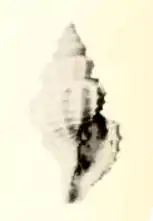| Neopleurotomoides callembryon | |
|---|---|
 | |
| Original image of a shell of Neopleurotomoides callembryon | |
| Scientific classification | |
| Domain: | Eukaryota |
| Kingdom: | Animalia |
| Phylum: | Mollusca |
| Class: | Gastropoda |
| Subclass: | Caenogastropoda |
| Order: | Neogastropoda |
| Superfamily: | Conoidea |
| Family: | Raphitomidae |
| Genus: | Neopleurotomoides |
| Species: | N. callembryon |
| Binomial name | |
| Neopleurotomoides callembryon (Dautzenberg & Fischer, 1896) | |
| Synonyms[1] | |
|
Pleurotoma callembryon Dautzenberg & Fischer, 1896 (original combination) | |
Neopleurotomoides callembryon is a species of sea snail, a marine gastropod mollusk in the family Raphitomidae.[1]
Description
The length of the shell attains 3.1 mm, its diameter 1.5 mm.
The shell is quite solid. The spire barely exceeds half of the total height. The shell contains 6 whorls, separated by an impressed suture. The protoconch is composed of 4 whorls: the first two are smooth, the next two show vertical, straight and filiform riblets, cut by an acute peripheral keel. The subsequent whorls are impressed at the top by the infra-sutural zone which is furnished with arcuated lines of growth. Then they become convex and show strong longitudinal ribs (13 on the body whorl) and narrower cords narrower, but also very conspicuous (4 on the penultimate whorl and 12 on the body whorl) which pass over the peristome and determine, at the points of intersection, small acute tubercles. The ribs are closer together and less prominent at the end of the body whorl. The aperture is wide open, terminated at the base by an open siphonal canal. The columella is slightly twisted and acuminate at the base. The outer lip is arcuate, , tightly, but deeply indented at the top. The shell is white, the protoconch is barely tinged with light yellow. [2]
Distribution
This marine species occurs at bathyal depths off the Azores. [3]
References
- 1 2 Neopleurotomoides callembryon (Dautzenberg & Fischer, 1896). Retrieved through: World Register of Marine Species on 5 April 2010.
- ↑ Dautzenberg P. & Fischer H. (1896). Dragages effectués par l'Hirondelle et par la Princesse Alice 1888-1895. 1. Mollusques Gastéropodes. Mémoires de la Société Zoologique de France. 395-498, pl. 15-22
- ↑ Rex, Michael A., et al. "A source-sink hypothesis for abyssal biodiversity." The American Naturalist 165.2 (2004): 163-178.
- Gofas, S.; Le Renard, J.; Bouchet, P. (2001). Mollusca. in: Costello, M.J. et al. (eds), European Register of Marine Species: a check-list of the marine species in Europe and a bibliography of guides to their identification. Patrimoines Naturels. 50: 180-213.
External links
- Serge GOFAS, Ángel A. LUQUE, Joan Daniel OLIVER,José TEMPLADO & Alberto SERRA (2021) - The Mollusca of Galicia Bank (NE Atlantic Ocean); European Journal of Taxonomy 785: 1–114
- Tucker, J.K. (2004). "Catalog of recent and fossil turrids (Mollusca: Gastropoda)" (PDF). Zootaxa. 682: 1–1295.